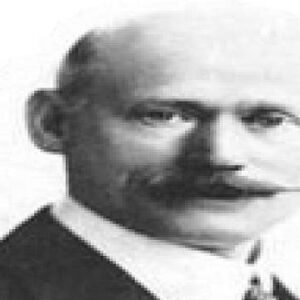Frank Hornby was a well-known British inventor, businessman, and politician who used engineering principles to revolutionize the concept of toy-making. His father was a provisions merchant, which may have piqued his interest in the operation of various objects. He left school at the tender age of sixteen, as he did not believe in traditional education, and began working for his father as a cashier. Frank worked as a bookkeeper for David High Elliot following his father’s death. During this time period, he began making toys in a home workshop constructed entirely of sheet metal. Later, he recognized the value of interchangeable components that can be assembled and bolted together to create a variety of models using the same components. Hornby, sensing the potential of his discovery, decided to market his designs and also obtained a patent for them. Initially known as ‘Mechanics Made Easy,’ the business quickly flourished. Because the toys were enjoyable, unique, and educational for children, the brand eventually adopted the moniker ‘Meccano’. Despite the fact that the renowned entrepreneur lacked an engineering degree and a conventional education, it was his strong desire that resulted in the creation of ‘Meccano’. Later on, he expanded his product line to include Dinky toys and Hornby train models. He later became a Conservative MP and died a millionaire.
Childhood & Adolescence
Frank Hornby was born in Liverpool on 15 May 1863, the son of Martha and John Oswald Hornby. He dropped out of school at the age of 16 and began working as a cashier in his father’s business. He later revealed that he was dissatisfied with traditional education and was quite inspired after reading self-help by Samuel Smiles.
Career of Frank
Hornby took a job as a bookkeeper with David Hugh Elliot in his meat importing business in Liverpool in 1899, following his father’s death.
Hornby began making toys, specifically for his two small sons, during his tenure with David, specifically in 1899, in a workshop he had established at home. The toys were frequently constructed from a single long sheet of metal.
Initially, the pieces were not interchangeable, but he quickly realized the potential of interchangeable components that could be bolted together in a variety of ways to create a new model each time.
By 1900, Hornby’s designs had been simplified, and instead of permanent fixtures, he created parts that could be connected in a variety of ways using bolts and nuts. He was aware that he was prepared to market his wares.
Hornby obtained a patent for his products in 1901 by borrowing a small sum of money from David Elliot. This invention was subsequently dubbed ‘Improvements in Toy or Educational Devices for Children and Youth’. Elliot recognized the enormous potential in this business and began financially supporting him, resulting in the formation of a business partnership.
Hornby was also backed by Henry Selby Hele-Shaw, the Head of Department of Engineering at the ‘University of Liverpool,’ which enabled Hornby to procure all of the supplies required to manufacture the toys.
In 1902, ‘Mechanics Made Simple’ was published. The company sold sixteen distinct pieces and distributed a leaflet explaining how twelve distinct models could be constructed using those sixteen odd components. They sold 1500 sets the following year, but the company did not break even.
In 1904, new components were introduced and were packaged with instructions written in both English and French to broaden the product’s appeal to customers.
They made their first profit in 1907, when Hornby quit his job at Elliot’s and began manufacturing his own toy parts with the assistance of a loan.
The increase in production resulted in the establishment of ‘Meccano Ltd.’ in 1908; Elliot withdrew from the company, leaving Hornby as sole proprietor. Hornby’s business expanded over the years, and with the assistance of his son, he established operations in Paris and Berlin.
Hornby invented the ‘Hornby System of Mechanical Demonstration’ and clockwork motors in 1907. He continued to design toys and invented the ‘O gauge clockwork trains’ in 1927. Soon after, the set’s trackside accessories and English village setting were added.
In 1934, he introduced die-cast vehicles under the name ‘Dinky toys,’ which has grown to include over 200 different products. He dabbled in politics in the 1930s, serving as a Conservative Member of Parliament for Everton.
Significant Works of Frank
Hornby revolutionized the concept of engineering-based toy manufacturing. He conceptualized the concept of creating interchangeable models using the same components that are also flexible and can be bolted together without the use of bolts or screws. He founded the toy company ‘Meccano Ltd.’ and was also responsible for the introduction of clockwork trains and Dinky toys.
Personal History and Legacies
Hornby married Clara Walker Godefroy, a school teacher, on 15th January 1887. Douglas and Roland were their sons, and Patricia was their daughter.
He was declared a millionaire in the 1930s, owned a sprawling mansion in Maghull, and commuted to work in a chauffeur-driven limousine.
He died in Lancashire, England, on September 21, 1936. Two years later, in honor of the great inventor, his son Roland introduced the ‘Hornby Dublo Model,’ a railway system.
Estimated Net Worth
Frank is one of the wealthiest entrepreneurs and is listed on Forbes’ list of the most popular entrepreneurs. Frank Hornby’s net worth is estimated to be between $1-5 million, based on our analysis of Wikipedia, Forbes, and Business Insider.


